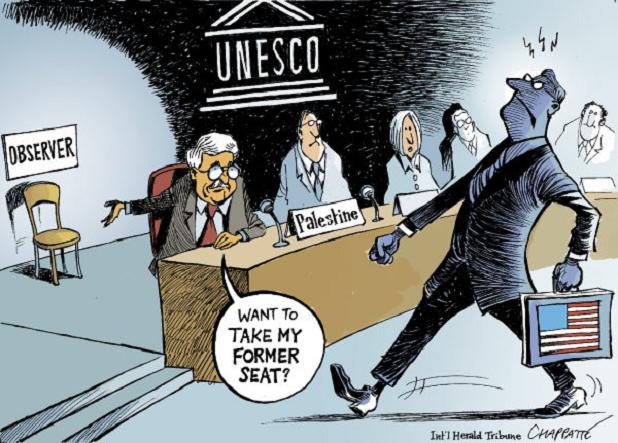The US debacle at UNESCO must be corrected Comment
New in Ceasefire, Politics - Posted on Sunday, December 4, 2011 19:26 - 0 Comments
By James Early
(Cartoon © Chappatte)
The U.S. government decision last month to withhold funds from UNESCO, after a majority of U.N. countries approved full membership for the Palestinian Authority into the U.N. agency, is another troublesome sign of U.S. imperial behaviour attempting to thwart measured diplomatic judgement and the democratic will of the community of nations.
The decision signals the U.S. government is becoming more unilateral in policy actions and contradictory in principles as it foils the objectives of cooperation it officially espouses. This action reflects an all too common statecraft of punitive measures when multilateral protocols among nations lead to majority decisions that cannot be controlled and are put into force by globally accepted procedures that cannot be vetoed.
Withholding UNESCO funds is notably counterproductive to U.S. highly-touted emphasis on a new cultural diplomacy. The imprudent decision to subvert consensus-building, automatically triggered by U.S. law, also highlights self-interested and self-imposed limitations to be a fair dealing partner in pursuit of global justice -in this case justice for Palestinians, one of the most aggrieved peoples and denied nations. Such a vindictive policy should also cast doubts for U.S. arts, culture, and cultural policy communities over prospects of current U.S. inter-agency discussion about signing on to UNESCO cultural diversity and intangible cultural heritage conventions.
For the U.S. public, especially those directly involved in the arts, culture, education, and science, withholding U.S. allocations to UNESCO thrusts them in the middle of diplomatic and cultural politics about which they are poorly informed by the government. U.S. arts, cultural and scientific professionals and organisations are also blameworthy for being generally disengaged or compliant followers of U.S. government Realpolitik and corporate commercial interests.
The “I will not play if you don’t follow my lead” approach is ultimately a negative and losing strategy. An anthropologist colleague, Angela Gilliam, in Washington State wrote to me “this is déjà vu all over again. Remember Reagan walking out of UNESCO in December 1984”. U.S. imperial play was then in response to 1980s UNESCO conflict over the “New World Information and Communication Order”, a political initiative by developing countries to provide more balance in the flow and content of news between developed and developing countries.
When the U.S. returned to UNESCO in 2003 under the Administration of President George W. Bush, the UN agency was ironically in the middle of debate about the Convention on the Protection and Promotion of the Diversity of Cultural Expressions (the Cultural Diversity Convention). Some cultural policy analysts argue the roots of the UNESCO Cultural Diversity Convention debate flowered in large measure from the seeds of earlier conflict over the New Information Order.
Eight years after returning to UNESCO, the U.S. government has abdicated its leadership by abandoning the policy fray over human and cultural rights for the oppressed Palestinian people and their right to join the hall of Nations. Benjamin R. Barber, Distinguished Senior Fellow at DEMOS and President of CivWorld, commented that it is “absolutely absurd for the US to withdraw funding from UNESCO on this pretext. It is part of the government’s antipathy to interdependence”.
By withholding funds to UNESCO, the U.S. government once again thrusts U.S. educational, science, arts and cultural practitioners, including museums and service organisations into the cauldron of real/cultural-politik. They should be greatly concerned that UNESCO is now a crucible of the globally-challenged proclaimed right and might of U.S. and Israeli governments to decide how, when, and where Palestinian self-determination will be advanced.
Will U.S. allies in UNESCO remain silent and complicit in their inaction on political matters which they have not been consulted? Or will they exercise their rights and obligations as citizens to petition their government in their role as communities of knowledge and spiritual wellbeing guided by standards of justice for all?
As collegial citizen communities of interests, such candid questions must be raised and answered about how withholding funds advances or undermines the UNESCO mandate “to contribute to peace and security by promoting international collaboration through education, science, and culture in order to further universal respect for justice, the rule of law, and human rights along with fundamental freedoms proclaimed in the U.N. Charter”.
The negative impact on U.S. citizens-related UNESCO undertakings could become even more destructive if the Palestinian Authority is admitted to other UN agencies like WIPO, WHO, and IAEO, and the White House and both political parties resort again to existing laws to cut funding.
Nevertheless, UNESCO and the wider world has moved on, with reduced U.S. government leadership contributions and funding, and the U.S. public slips further behind, increasingly isolated from global cultural heritage policies and mediations of justice, equality, peace, and development.
This course of events can be improved upon, and hopefully reversed, by U.S. cultural heritage and arts advocacy and preservation organisations stepping up to craft a U.S. State cultural policy more reflective of the ethical and disciplinary interests of citizen-artists-educators-scientists-scholars to bring about joy, knowledge, justice, peace, and security.
A new progressive democratic U.S.-U.N.-UNESCO relationship could be hastened and enhanced if our global counterparts, particularly from Palestine and Israel, call upon us to be more informed, collegial, and to act justly!




Leave a Reply